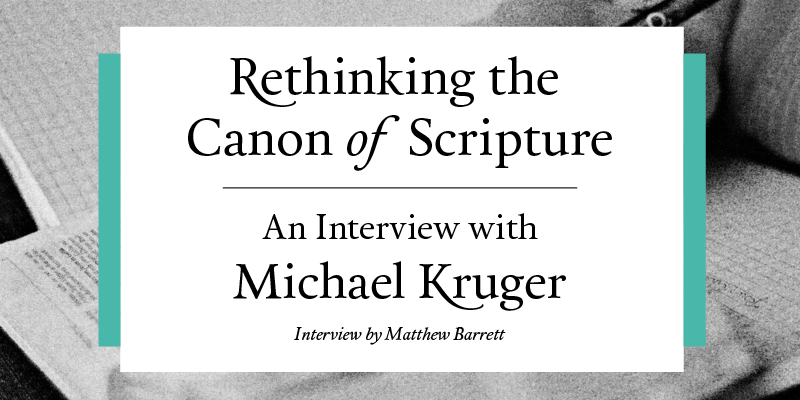
Rethinking the Canon of Scripture: An Interview with Michael Kruger
Michael J. Kruger is President and the Samuel C. Patterson Professor of New Testament and Early Christianity at Reformed Theological Seminary in Charlotte, NC. He is one of the leading scholars today in the study of the origins of the New Testament, particularly the development of the New Testament canon and the transmission of the New Testament text. He is the author of numerous books including Canon Revisited and The Question of Canon. In the most recent issue of Credo Magazine, “By the Book: How Well Do You Know the Bible?”, executive editor, Matthew Barrett, asks Kruger some probing questions to help us come to a more accurate understanding of the canon of Scripture.
Many scholars have approached the canon of Scripture thinking that they must find that special date in the early centuries of the church when the canon was finally closed and the church officially declared the books of the New Testament canonical. But you completely reorient our approach to the canon when you say in your book Canon Revisited, “From the perspective of God’s revelational activity, a canon exists as soon as the New Testament books are written—the canon is always the books God has given to the corporate church, no more, no less.” This sentence seems to get to the very thesis of your book. So tell us, what do you mean and why is this so different from how others have approached the canon?
Most modern approaches to canon are done on only a historical level, with no serious attention to the theology of the canon. Thus, when scholars want to investigate the “date” of the canon, what they are really investigating is the date of the reception of the canon by the early church. Investigating the date of the reception of the canon is entirely legitimate—but it’s not the whole story. In addition to the date of the canon’s reception, there is also the question of the date of the canon’s existence. And this latter issue can only be discussed when theological considerations are allowed into the discussion (e.g., canonical books are given by the inspiration of the Spirit). One might say this is looking at the canon from a “divine” perspective, rather than just a human one.
Some Roman Catholics have argued that the canon of Scripture is derivative from the church or caused by the church. For example, Hans Küng said, “Without the Church there would be no New Testament.” What are some fundamental problems with such an approach to Scripture?
Fundamentally, the Roman Catholic approach ends up confusing the instrument God uses to produce the Bible (human beings who are part of the community of faith) with the ultimate cause of the Bible (namely God himself). Thus, it is misleading to say that the church “caused” the Bible. Sure, they were the means God used, but it is ultimately God who is producing the Bible through human authors. Therefore it is entirely appropriate to say that the church is subject to the Scriptures and that the Scriptures are over the church (rather than vice versa). Like anything else in creation, the church is also a creatura verbi—a “creation of the Word.” …
Read the rest of this interview today!
View the magazine as a PDF (Click Here)
 How well do you know your Bible? Now that is a scary question, even if you have been a Christian for a long time. Between church events, little league games, and a full-time job, finding time to read and study Scripture is a herculean task. To make matters worse, when you finally do escape to read the Bible you struggle to understand what it means. At times you can relate with the Ethiopian eunuch who said to Philip when asked if he understood what he was reading, “How can I, unless someone guides me?”
How well do you know your Bible? Now that is a scary question, even if you have been a Christian for a long time. Between church events, little league games, and a full-time job, finding time to read and study Scripture is a herculean task. To make matters worse, when you finally do escape to read the Bible you struggle to understand what it means. At times you can relate with the Ethiopian eunuch who said to Philip when asked if he understood what he was reading, “How can I, unless someone guides me?”
In this issue of Credo Magazine we are here to help! If you feel tired and frustrated, this issue will give you that shot of adrenaline you need to keep going. And if you feel like you just don’t have the tools in your belt to interpret the Bible properly, then you are in good hands. Consider this an exercise in going to the hardware store to find those tools you need to comprehend the Bible. Obviously this issue of the magazine won’t give you all the tools you need, but we hope to get you started, even provide you with the motivation you need to study the Bible on your own. Sure, it’s hard work. But hard work pays off. And maybe one day you will be able to say, “Hey, I do know the Bible, and I think I can help someone else understand it too.”
Contributors include: Robert Plummer, Ardel Caneday, Michael Kruger, Deven K. MacDonald, Paul D. Wegner, Augustus Nicodemus Lopes, Kevin DeYoung, Douglas Moo, and Thomas Schreiner.
